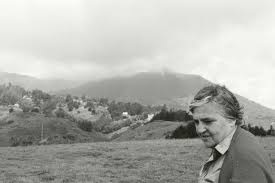“The morning after my death…we will sit in cafés…but I will not be there…I will not be” a verse for the celebrated Syrian Lebanese American writer and artist,Etel Adnan, who passed away on Sunday 14 of October in Paris. She was 96.
Poet, essayist, and painter Etel Adnan was born in Beirut, Lebanon. The daughter of a Greek Christian mother and a Syrian Muslim father, she spoke both Greek and Arabic with her parents, but French became her primary language upon enrolling in a French Lebanese Catholic school at the age of five.
Etel Adnan was born in 1925 in Beirut, Lebanon. Her father, Assaf Kadri, was a Damascus-born Syrian and a retired official in the Ottoman army. Her mother, Rosa Kadri, was a Greek that grew up in Smyrna, which is now known as the Turkish city of Izmir. (Kadri changed the family’s surname to Adnan, his father’s first name, in 1932.) Etel described her father as an “unemployable man,” dislocated by the dismantling of the Ottoman Empire. Her mother’s hometown was burned in 1922. “I grew up with people who were defeated when they were still young,” she said.
 Over the course of half a century, Adnan explored themes of national identity, and feminism in the Arab world in astute poetry and prose. Adnan taught philosophy at San Rafael’s Dominican College from 1958 to 1972, where, in connection with the ongoing Algerian war of independence, she began to resist the political implications of writing in French.
Over the course of half a century, Adnan explored themes of national identity, and feminism in the Arab world in astute poetry and prose. Adnan taught philosophy at San Rafael’s Dominican College from 1958 to 1972, where, in connection with the ongoing Algerian war of independence, she began to resist the political implications of writing in French.
To address this conflict, she shifted the focus of her creative expression to visual art and began making abstract oil paintings. In response to the Vietnam War, Adnan began to write poems again, though in English rather than French. She moved back to Lebanon to become the cultural editor of the new French-language newspaper Al-Safa.
After the Lebanese civil war began, Adnan moved to Paris, where she wrote the novel Sitt Marie Rose (1977), which won the France-Pays Arabes Award.This novel is among the defining texts of Lebanon’s 15-year civil war. Composed in French and since translated into several languages, the novel examines the intersection of gender and politics.
Influenced by Rimbaud, Lyn Hejinian, and Jalal Toufic, Adnan’s poetry incorporates surrealist imagery and powerful metaphorical leaps with language-based and formal experimentation, using unexpected and experimental techniques to address the nature of exile and political, social, and gender-based injustice. Adnan is the author of numerous books of prose and poetry, and is also a painter, sculptor, and weaver whose art has been exhibited internationally.
Her collections of poetry include Seasons (2008); There: In the Light and the Darkness of the Self and the Other (1997); The Spring Flowers Own & Manifestations of the Voyage (1990); The Indian Never Had a Horse (1985); and Moonshots (1966).
Later works such as the poetry collection Arab Apocalypse (1980); Of Cities and Women (Letters to Fawwaz), a 1993 book of letters of the artist’s letters; and In the Heart of the Heart of Another Country (2005), a series of vignettes about the personal and the political, have also become touchstones for generations of writers and artists.
“I WRITE WHAT I SEE; I paint what I am,” Adnan wrote in her 1986 essayistic daybook, Journey to Mount Tamalpais, which contains an account of her painting practice. “To each place, there is a counter place,” she notes.Elsewhere in the piece, Adnan observes, “I feel trapped in this universe and think of what an anti-universe could mean, which is still a universe; there is no way out.”
In a 2009 interview published in Bidoun, she told novelist Lynne Tillman that “I don’t lie when I write.” Adnan explains: “Something happens, and I must discover it. Writing forces one to go to the bitter end of what one thinks.” If there is something propulsive and urgent about the act of writing for Adnan, then perhaps painting provides a more restorative relationship to the line.
For those of us who feel “trapped in this universe,” Adnan offers not so much an escape as a key to the unlimited potential inherent in the apparently humble present. “I see infinite distances between any point and another,” she writes in “Sea,” a long prose poem published in 2012. “That’s why time has to be eternal.” Adnan’s artist’s books, her leporellos, dip into the seam of the fold, a shady counter-place rich with thinking. They emerge again to get on with the story, a tale that now seems unending, for what is an ending, anyway, if not another fold?
Lama Alhassanieh

